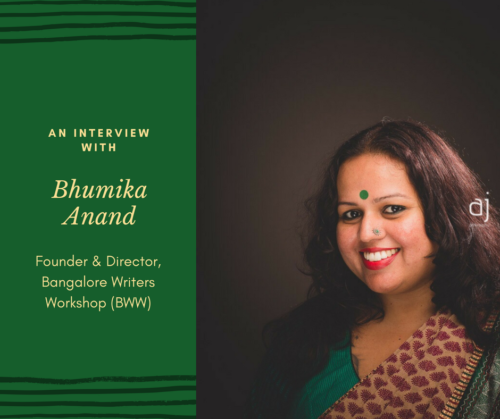Interview by Vani Viswanathan
Bhumika, thank you for taking the time out for this interview. To begin with, what made you want to help others hone their writing skills?
First of all, thank you for this opportunity.
So I started my career as a trainer and writer. I always knew that I would eventually start a school around communication and language. When Facebook happened, I reconnected with Rheea Mukherjee, my junior from college, who was pursuing her MFA in San Fransisco then. We started exchanging stories and giving each other feedback. Later when she moved to Bangalore, we decided to start Bangalore Writers Workshop because no one else was doing it, and the workshop model had worked for us individually. BWW is five years old now. I continued to run BWW even after Rheea quit a year and a half later, and made it into a writing school where people could hone all kinds of writing because I was doing exactly what I wanted to do in life: helping people read, write, and communicate better, and making them think about how we engage with each other and the world.
Thanks to the Internet, it’s quite easy for anyone to publish their writing to the world and get feedback from friends and peers. Given this, how do participants typically approach a writing workshop? What do they expect from it, how do they react to learning and critiquing techniques, and what do they take away from it?
Internet does make everything easy. But it also makes things superficial. Most of my students come to BWW because they know this to be true. Friends and family are not necessarily guiding posts to becoming better writers. Writing is a skill, and writing fiction or poetry takes some craft that needs to be learned, understood, honed, and applied. This is what they get at BWW. The workshops are intensive and exhaustive. Participants are immersed in reading texts they would otherwise probably not read, learning various aspects of writing, and exchanging feedback in a safe and open learning environment. All of this have made and do make them better writers. The feedback is honest and critical but not discouraging or cruel, so even those of us who are very sensitive tend to not mind what we hear. At the end of the day, in a workshop, everyone wants you to write the best story/poem/article you can.
Who is the typical participant/learner at your workshop? Do they tend to be of a certain age, gender, etc.? Which kind of participants have you encountered more – the ones who demonstrate a fair deal of writing talent and are looking to enhance their skills or people who perceive writing as a craft and attempt to learn it from scratch?
In my experience, participants are simply people who love the written word in English. There’s no particular demographic that we are catering to.
Since we do have a screening process where we evaluate samples for creativity and language, people in the workshop can all always write. They might not have written much, but that’s fine. We have had participants who have been published before they sign up as well, and they’ve told me that BWW is still a life-changing experience for a writer. It’s not surprising they say that and I won’t take credit for that, because it’s the workshop model. BWW is about finding a community of writers and friends you can count on for friendship or feedback long after the workshops are over. As facilitators, we work very hard on instilling that culture.
What do you like about what you do? And what’s challenging?
In one word: Everything. I honestly cannot imagine doing anything else.
The challenge really is more on the business side of things – handling administrative tasks, finding more facilitators who share the same ethos to writing and creating, ensuring we deliver all workshops with the same quality across the school, that sort of thing.
How does ‘teaching’ writing have an impact on your own creative writing? Have you seen it change over the years?
I am more comfortable calling myself a facilitator when it comes to BWW. We don’t teach writing; that would be prescriptive. We don’t say, ‘Write this way, do this, and don’t do anything else.’ We are guides and mentors who hone existing talent.
So, yes, working with writing and writers has made my own writing sharper, clearer, and more nuanced, I think.
It’s also great to have around 500 odd people who will read and give me solid feedback on my writing.
What’s not good is that I am so exhausted with the classes and critiquing, that I often don’t have the head-space to work on my own writing.
Of course, while I recognise the truth of that, it’s also just a rubbish excuse.
Finally, what are some ‘non-negotiables’ about writing that you pass on to your students through the courses?
The most obvious one is that you simply cannot become a good writer if you don’t also read voraciously.
Since I am extremely particular about language, I am always telling my writers that they should own their language and grammar. They cannot depend on good copyeditors to proofread and clean up their work.
The most important non-negotiable in my workshops is writing with intent and inculcating a spirit of openness and empathy. As writers, we need to examine the world critically. But if we don’t also keep an open mind, study contexts, and engage with empathy, then it all becomes mere persiflage or rhetoric. Why are we writing?





